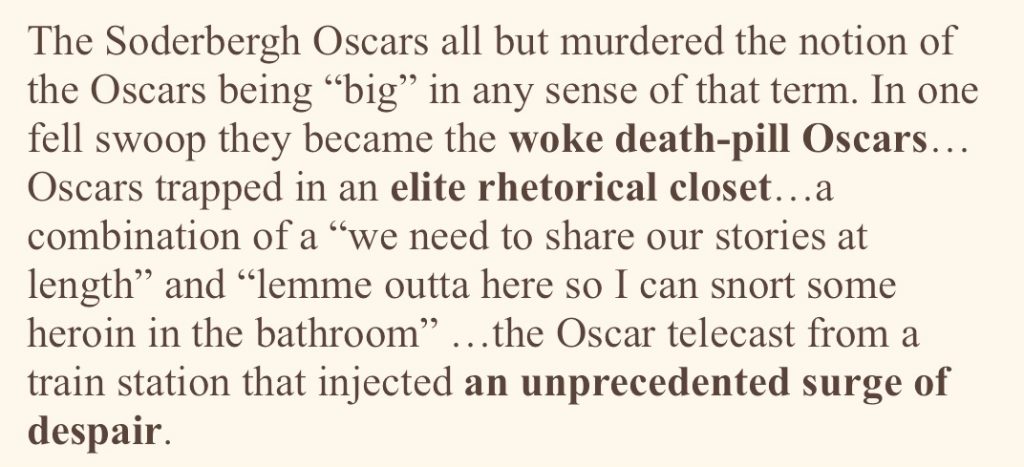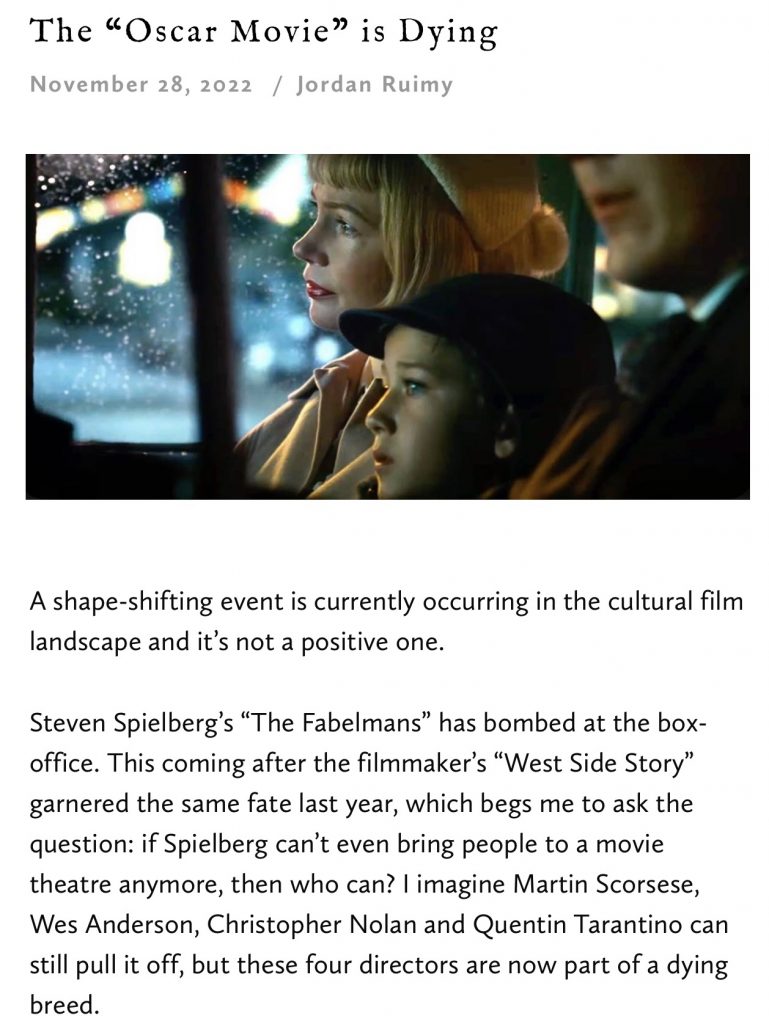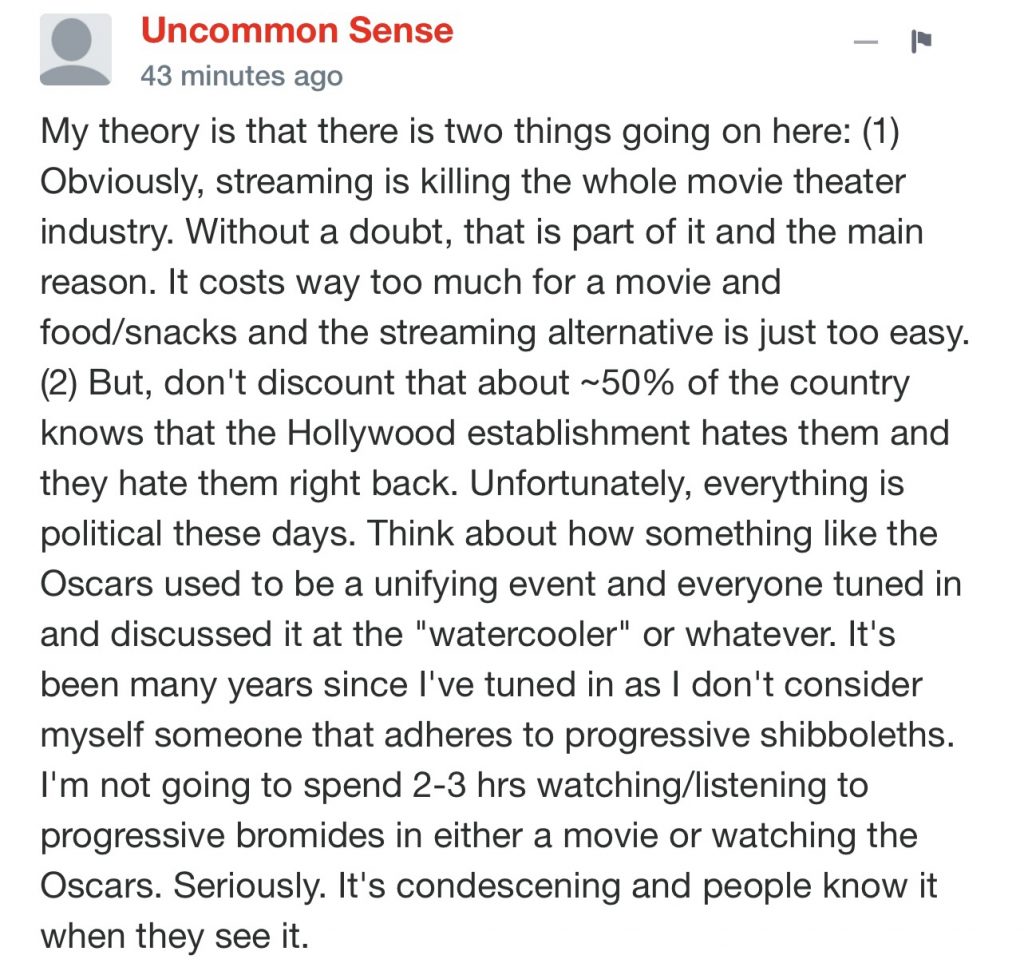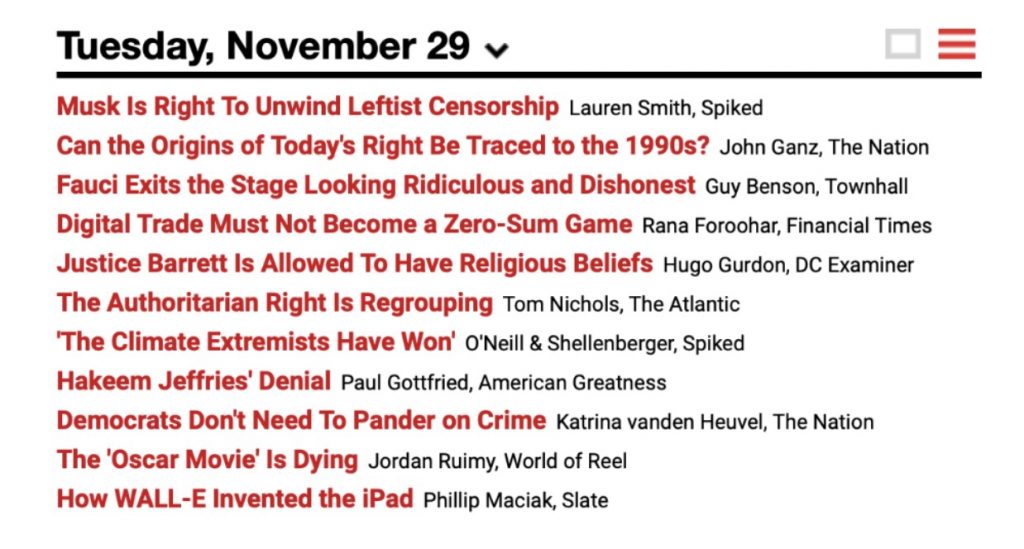
Day: November 30, 2022
Between Showings
Today I caught two year-end films at Dolby 24 (1359 Sixth Avenue, 28th floor) — Antoine Fuqua and Will Smith‘s Emancipation at noon, and then Sam Mendes‘ Empire of Light (Searchlight, 12.9), which I initially saw in Telluride three months ago.
I’m sorry but despite a certain over-calculated tidiness and occasional on-the-nose moments that pop through now and then, Empire of Light remains my favorite film of the year — the most romantic, the most emotionally delicate and soothing and subtle and soft-touchy, and filled with satisfying and at times even sublime performances.
The great Olivia Colman towers above all, but Michael Ward, Colin Firth, Tanya Moodie (as Michael’s mom), Toby Jones and Tom Brooke…everyone is just right.
I’ll share some Emancipation thoughts later this evening.
Christine McVie
There was something so soulful and sensual (at least in my head) about Christine McVie‘s singing voice. And I always sensed something randy about her nature. She was hot and heavy with Dennis Wilson in ’73 or ’74…something like that. I used to fantasize about her now and then…sorry.
Of all the Fleetwood Mac hits McVie crooned, my all-time favorite is the melancholy “Did I Ever Love You?.” (Or “Did You Ever Love Me?” — one of those.) Co-written by McVie and Bob Weston, it’s about a relationship that’s no longer working, largely due to the guy behaving like an aloof dick for too much of the time.
Released as a single in ’73, the song didn’t track. “Did I Ever Love You?” is Fleetwood Mac’s only flirtation with steel drums, which obviously makes it sound kind of Jamaican.
‘
McVie passed today at age 79. I’m very sorry.
Friendly “Babylon” Screenings
I’ve been working on launching a special industry-friendly film series at the renowned Bedford Playhouse, which is run by Dan Friedman. The program is called Bedford Marquee, and a 12.5 screening of Damien Chazelle’s Babylon will kick things off.
I’ll be offering a few observations (including some historical footnotes) a few minutes before the show begins at 7 pm.

Located within the Clive Davis Arts Center, the BP is one of the finest commercial screening facilities I’ve ever settled into — easily the technical equal of any upscale industry screening facility (including the Academy Museum theatre and/or the classic AMPAS theatre in Beverly Hills) in the U.S., Paris, Cannes or anywhere.
Esteemed restoration guru Robert Harris supervised the BP’s upgrade.
We’re also planning a special mid-January screening of the recently restored Invaders From Mars (‘53). The film was painstakingly restored by Scott MacQueen, who will present a master class about the film’s history and cultural influence.
A sprawling three-hour epic of 1920s Hollywood, Babylon opens nationwide on 12.23.

Media Types Rooting for “Avatar’s” Shortfall
From “Avatar and the Mystery of the Vanishing Blockbuster,” a N.Y. Times Sunday Magazine piece by Jamie Lauren Keiles (11.30.22):
“The history of recorded images might be described as an incremental quest to master the building blocks of consciousness — first sight, then motion, then sound, then color. With Avatar (’09), Cameron revealed that human ingenuity could marshal even more: physics, light, dimensionality; the ineffable sense of an object being real; the life force that makes a thing feel alive.
“This is not to say that Avatar is good. The movie is basically a demo tape, each plot point reverse-engineered to show off some new feat of technology. The awe it inspires was not just about itself but rather the hope of new possibilities. It was easy to imagine someone in 2009 leaving the theater and asking: ‘What if we made more movies like this? What if we made good movies like this?’
“The year 2009 was a relatively optimistic one: Obama had just won on the audacity of ‘hope.’ Climate change still felt far away. The forever wars were going to end. Surely we would fix whatever caused the recession. Avatar pointed toward a widening horizon — better effects, new cinematic worlds, new innovations in 3-D technology. It did not yet seem incongruous to wrap a project based in infinite progress around a story about the perils of infinite growth.
“Avatar: The Way of Water (20th Century, 12.16) will emerge into an almost total deferment of that dream. Today, 3-D is niche (at best); digital effects are used to cut costs; home streaming is threatening the theater; and projects of ambitious world-building are overlooked in favor of stories with existing fanbases.”

Balenciaga Furor Scripted by Ruben Ostlund?
If you’ve seen Ruben Oastlund‘s The Square you’ll recall that the downfall of Claes Bang‘s “Christian,” curator of Stockholm’s X-Royal art museum, is caused by a risque video ad.
A promotion for an art installation called “The Square,” it shows a very young white ragamuffin blonde girl being blown to bits. The video quickly goes viral for obvious reasons, and before anyone knows it media types, religious figures and Average Joes are calling for Christian’s head.
A similar child-related scandal erupted five or six days ago over a pair of Balenciaga ads that seemed to blend images of little girls with suggestions of BDSM, conveying a perverse and icky mentality that many felt had crossed an ethical line. Teddy bear purses, bondage accessories, etc.
Bakenciaga reps have apologized for both ads and removed them from their social media. Nonetheless angry reactions have resulted in a Balenciaga store in Beverly Hills being trashed and graffiti’ed. Celebrities who’ve promoted Belnciagia product, including Kim Kardashian, Isabelle Huppert and Nicole Kidman, have been pressured to cut ties, etc.
Here’s an 11.29 timeline piece by insider.com’s Samantha Grindell.
The Balenciaga uproar is strikingly similar to the one depicted in The Square…just saying.

Beethoven’s Funeral March
“The ‘Oscar Movie’ Is Dying,” an 11.28 lament by World of Reel’s Jordan Ruimy, was linked to yesterday (11.29) by Real Clear Politics — congrats.
Owen Gleiberman’s 11.29 review of the apparently loathsome Violent Night (Universal, 12.2) acknowledges the same dynamic — on top of 2022 award-season films exuding a curious “meh” lethargy, Joe and Jane Popcorn (especially the 40-plus crowd) have mostly shined the notion of seeing these films in theatres:
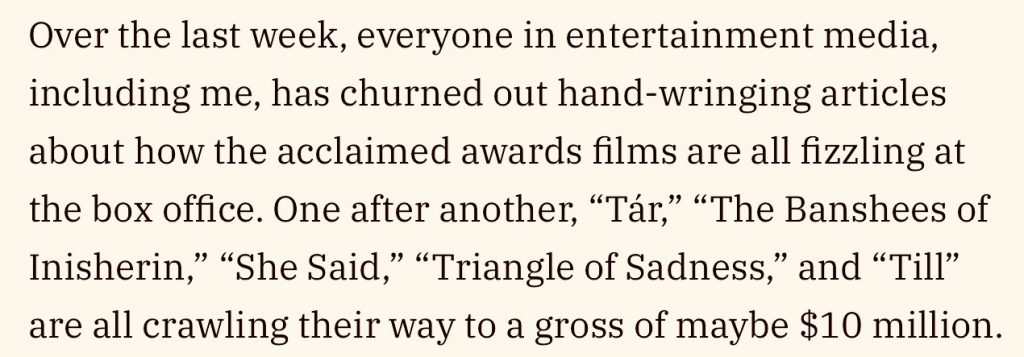
One key reason is that there’s zero overlap between elite industry sensibilities and the generally coarse, cynical and fed-up attitudes of popcorn inhalers.
The introduction to that brilliant 11.28 video essay on the Oscars’ 94 year history reminds that over the last decade award-season films have become their own separate and myopic genre — and with the pernicious SJW factor the vast majority has simply tuned them out.
The decisive gutshot bullet that killed the award-season brand (I’ve said this over and over) was fired on 4.25.21 by Steven Soderbergh, producer of the 93rd Academy Award telecast.
From “Norma Desmond: It’s The Oscars That Got Small,” posted on 9.30.21:
